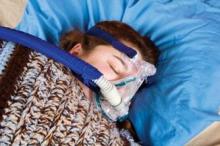Obstructive sleep apnea syndrome (OSAS) is a very common, underrecognized disorder with significant implications for individual and global health. Over the past few decades, our understanding of OSAS has improved, leading to earlier diagnosis and treatment. In turn, increasing awareness of this disorder has yielded greater recognition of the sequelae associated with OSAS, including heart disease, stroke, and cognitive impairment.
OSAS can affect cognition across the lifespan from infants to geriatric patients. Habitual snoring during the first year of life has been associated with lower scores on the Bayley Scales of Infant and Toddler Development, comparable with those seen in infants with iron-deficiency anemia (Grigg-Damberger et al. Curr Opin Pulm Med. 2012;18[6]:580). Such scores can predict future intelligence quotient scores, educational achievements, and job performance (Dezoate et al. Child. 2003;29[5]:367). OSAS of any severity as well as habitual snoring has been shown to increase the risk of hyperactivity, inattention, and poor school performance in children (Bourke et al. Sleep Med. 2011; 12[3]:222), and some of these metrics have been shown to improve with therapy. Thus, even primary snoring in children should not be considered a wholly benign condition.
Mild cognitive impairment (MCI) is defined as a subtle but measurable cognitive dysfunction, greater than that which would be expected with normal aging; memory loss is typically the presenting symptom. The conversion rate of MCI to frank dementia is roughly 15% per year (Petersen et al. Arch Neurol. 1999;56[3]:303). OSAS has been shown to be associated with MCI in adults (Cosentino et al. Sleep Med. 2008;9[8]:831); studies have also shown OSAS to be associated with impaired vigilance (Findley et al. Chest. 1995;108[3]:619) and executive function (Naismith et al. J Clin Exp Neuropsychol. 2004;26[1]:43). Thus, the cognitive dysfunction associated with OSAS is a real and measurable problem. If these relationships are causal, as one might suspect, aggressive screening for OSAS in patients with MCI might be warranted in the hope of reversing the disorder.
There are likely to be multiple mechanisms underlying the association between cognitive impairment and OSAS. Excessive daytime sleepiness can induce an impairment of vigilance and memory, both of which are components of cognitive function. A vicious cycle may ensue, with patients forgetting to use their CPAP, leading to worsening cognition. Intermittent hypoxemia is associated with a pro-inflammatory state and endothelial dysfunction that may be the intermediate mechanism by which cognitive impairment occurs. Genetic factors may modulate the association between cognitive impairment and OSAS. The apolipoprotein E4 allele located on chromosome 19 is a strong risk factor for early-onset Alzheimer’s disease and has been shown to increase the risk of developing both OSAS (Kadotani et al. JAMA. 2001;285[22]:2888) and neurocognitive decline among patients with OSAS (Gozal et al. Neurology. 2007;69[3]:243). A higher intelligence quotient, younger age, and higher education level may protect the brain from the detrimental effects of the intermittent hypoxia associated with OSAS (Grigg-Damberger et al. Curr Opin Pulm Med. 2012;18[6]:580). The situation becomes even more complex when considering other comorbidities often exist in the OSA population and can affect cognition, including tobacco and alcohol use, stroke, hypothyroidism, congestive heart failure, obesity, psychoactive medication use, and depression, among others.
Neuroimaging techniques have been used to identify brain abnormalities in patients with OSAS. Functional and structural changes, as well as altered levels of neurochemical mediators like N-acetyl aspartate and choline, have been reported. A common finding among MRI studies is decreased volume of the hippocampus; functional MRI has shown decreased brain activation in the cingulate cortex and other brain regions during sustained attention tasks, compared with control subjects (Ayalon et al. Sleep. 2009;32[3]:373). Both of these brain areas, which are involved with memory consolidation, are also affected by gray-matter loss in patients with OSAS (Macey et al. Am J Respir Crit Care Med. 2002;166[10]: 1382). These changes may explain symptoms of retrograde and anterograde amnesia in such patients.
If OSAS is associated with cognitive impairment, then treatment might reverse the brain changes causing this impairment. A small study evaluated cognitive performance and brain morphology before and after CPAP treatment in patients with OSAS (Canessa et al. Am J Respir Crit Care Med. 2011;183[100]:1419). Testing before CPAP treatment showed impairment in several cognitive domains and focal reductions of gray-matter volume in the left hippocampus and several other brain areas when compared with healthy age- and education-matched control subjects. After CPAP treatment for 3 months, significant improvements in memory, attention, executive function, and gray-matter volume in hippocampal and frontal structures were seen, suggesting that even a short duration of CPAP treatment can partially reverse the brain abnormalities of OSAS.




